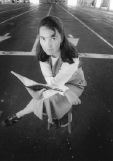NORTHWEST BOOKFEST began its life in a drafty but charming old warehouse on Elliott Bay back in 1995. The founding director was a publishing veteran named Kitty Harmon who ran the fest for its first three years. Now 41, Harmon is the editor of a just-published art book, The Pacific Northwest Landscape: A Painted History (Sasquatch), which features 140 paintings of the local terrain. We asked her to talk a little about the origins and evolution of Bookfest.
Seattle Weekly: When did you first start thinking about Bookfest?
Kitty Harmon: For six years [starting in 1987], I was head of sales and marketing at Sasquatch Books, when it was owned by Seattle Weekly, and I would go to various book festivals in different places around the country where we exhibited. And every time I would go to one of these I was struck by the irony that here in this part of the country, where there’s such a high rate of book buying and library usage, there was no citywide—or areawide—celebration of books and reading.
How did Bookfest get started?
I left Sasquatch and worked for a while in South Africa, and when I came back, I began talking to people about putting together a book festival. The Seattle Times came in with a substantial chunk of money as the presenting sponsor, so we had enough money to go forward. Then we were proceeding on three levels: trying to continue to raise money, trying to sign on authors to attend it, and trying to get sufficient hordes of volunteers together. Every year those are the three hurdles. You want to try and time the event when the bulk of authors are touring, and that’s preferably fall because I think people are sort of hunkering down with a pile of books for the winter.
How did you envision Bookfest being the same or different from what you saw in other cities? And how did you end up down on the waterfront?
I used to live in New York City before coming to Seattle. They would shut down a length of Fifth Avenue [for their books festival]; it’s an outdoor sort of carnival event. With the reality of fall in Seattle, we knew it had to be indoors. The pier was practically like being outdoors, but with a roof—albeit a leaky roof—over our heads. It had sort of a Seattle feel to it. We talked the Port into renting it to us. It was very affordable, which was really important at the time, and it wasn’t like, ‘Oh yeah, another event at Seattle Center.’ I kind of wanted Bookfest to carve out its own identity that way.
Did Bookfest move out of the pier by choice?
No, not by choice. It was condemned basically. I loved that pier. There wasn’t anything like it. The [Stadium] Exhibition Center [where Bookfest is now held] is the closest thing to that space, but it didn’t exist then. I thought [the pier] was a wonderful place, but we sure paid a lot of money to heat it—such as we did—and to bring all the Porta Potties down. It had its downsides.
How was Bookfest to be different from a trade show? And how did you determine who would participate?
Well, it’s not aimed for the trade. It’s aimed for the consumer or somebody who just loves going to readings, panels. San Francisco determined very early on that their focus was going to be only independent bookstores; no chain bookstores could exhibit there. Neither could they take any funding [from the chains]; it was very political and strident. At the other end of the spectrum was a festival that allied itself with megastores like Target, which would buy an entire aisle of exhibit space—so the little independent bookstores were in these tiny little booths in between huge stretches of Barnes & Noble and Wal-Mart and basically huge donors. We wanted to strike a balance where everyone could feel they had an equal presence-we were trying to be inclusive. We had a limit on the number of consecutive booths that any one exhibitor could buy. You feel like you’re turning money away when you so desperately need it, but at the same time, we felt that was important.
You directed Bookfest for three years. What’s been your role since then?
Oh, booster, biggest fan.
How do you think Bookfest has evolved?
I don’t think it’s changed very much except for the physical location. At this point it has become a definite date on the cultural map here.
What purpose do you think the festival serves?
I think the point is just that it’s a place you can come to, you can bring your kids, you can meet your friends there, there’re a whole bunch of different things you can do; it’s just, in a broader way, a big celebration of books and reading. I mean why not have a festival?








